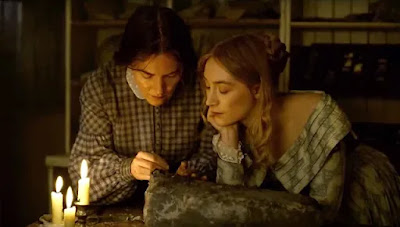Ammonite (2020): Written and directed by Francis Lee. Starring: Kate Winslet, Saoirse Ronan, Gemma Jones, and Fiona Shaw. Running Time: 120 minutes.
Rating: 3/4
A woman, alone, is on her hands and knees, feverishly scrubbing a wooden floor. Until, that is a sharp, male voice cuts across the screen, telling her to "Move!" Feet shuffle over the beams she'd just finished polishing, Serious Men about Serious Work. They are carrying a table of fossils, marked as having been discovered by Mary Anning. One of them glances briefly at the note with her name on it, snorts, then replaces it with one displaying his name instead.
So begins Ammonite, a movie for whom the word "subtlety" does not exist. I don't intend this as a critique, merely an observation of a film that I quite admire, even though its reception upon initial release was rather lukewarm given the pedigree of talent involved. Ostensibly based on rumors of a sexual relationship that may or may not have actually happened, Ammonite is centered around Kate Winslet as Mary Anning, a legendary and hugely influential fossil collector, and her friend Charlotte, played by my eternal heartthrob, Saoirse Ronan.
It is certainly more than past time for more people to get wind of Anning's remarkable life, as she remains (and I know the competition here is fierce) one of the more underappreciated women in history. And though the movie is certainly heavily fictional- it is unknown whether Anning had a sexual relationship with anyone, man, woman, or otherwise- but Winslet very much captures the spirit of her subject, bringing across her strength, intelligence, and dogged refusal to conform to the world around her, even as her name was repeatedly quashed by the men in her field.
Ronan's Charlotte, the wife of an admirer of Anning's who pops up only briefly at the film's start, is more or less forced on Anning after he leaves her in the seaside town alone to let her "recover" from what was either a miscarriage or death of their child. Feeling pushed into a caring role she feels unsuited for, Anning soon opens up more and more to her guest, while Charlotte quickly learns to appreciate the uniqueness of Anning in a time and place otherwise obsessed with social status.
I knew about the romance that builds out of this going into the film, and though my expectation of an English repeat of Portrait de la jeune fille en feu proved somewhat off the mark, this is still a tender story about two souls finding something deep and meaningful between them. Ronan and Winslet are both able to convey worlds with just their glances. This allows them to carry a film that is otherwise a little thin around them, which not much else there, aside from hints at a past relationship of Anning's that still haunts her and a surprisingly deep moment involving Anning's mother.
Seeded throughout is imagery and dialogue reflecting the themes of male dominance over women and the erasure of their presence and work, as well as ideas of loneliness and isolation. The early scenes with Charlotte are filled with moments like this; Charlotte, lying in bed, stares balefully at a moth trapped in a glad, suffocating to death. Or soon afterwards, when she is forced in the midst of grief to wade into the ocean, buffetted and torn by waves she neither wanted to experience nor is able to stop. It's simple, it's straightforward, but it remains effective even in the moments where the strings are obvious.
I do feel that their is a positivity in the film's existence that goes even beyond the end product itself. Both Ronan and Winslet have been very open about how empowering and enjoyable they found the experience, especially since they were given free reign to map out the movie's central sex scene. Dealing with sexuality in a positive and constructive way for all, male and female, is still something sorely lacking in mainstream cinema, and I would very much hope that this movie can act as a harbinger of things to come. Ronan went so far as to say that she even felt a little angry that it took this long for her to have an experience like this that did not feel demeaning or exploitative in some way. Sadly, this is not surprising, but it does highlight how unacceptable that part of current filmmaking should be in an ideal world.
Conveying so many ways that relationships form, only to be strained and threatened with breaking by the world around us, is the central pillar of Ammonite, a sweet and heartfelt and committed story of two souls with strength they themselves don't realize they possess. It came and went last year without much ablomb- which, given the circumstances, is understandable- but I think anyone and everyone should see it when given the chance.
-Noah

No comments:
Post a Comment